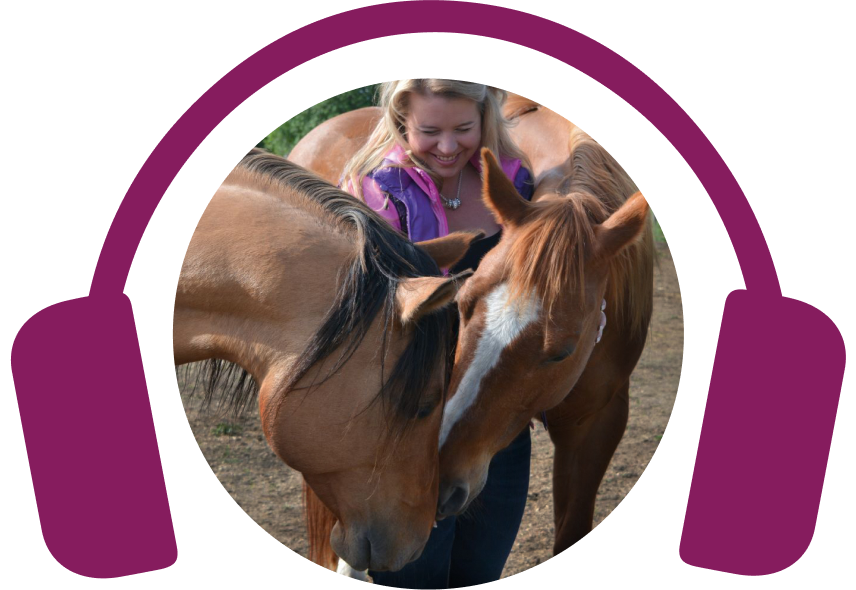Elisha’s Podcast
ELISHA’S PODCAST

Ready to get your horses on the path to better health?
This podcast was created to do just that.
Tune in to get new insights, perspectives, horse health tips, and real-life horse healing stories.
Take what you learn and apply it to your horse TODAY.

One Conversation at a time
From learning what to feed your horse and how to use nutrition effectively, to practicing prevention and approaching specific health challenges naturally, to just bringing your horse more joy and better health…
I’ve got you covered!

Check out my recent episodes
Today, we tackle hay, an essential yet often overlooked component of an equine diet. Hay provides most of the calories and nutrition horses need, especially in colder climates. However, it is not always the first place we look when issues arise. Since hay is dried grass with less nutritional value than natural forage, it is not a perfect food, yet it is what most horse owners must rely on. The quality of the hay, the treatments it has undergone, and how it affects your horse are critical factors to consider. That is why it is best to start with a hay analysis to ensure the foundation of their diet supports the health of your horse rather than adding to any hidden problems. What I Focus On First When analyzing hay, I always start with the macros- the protein, sugar, and fiber levels, as those are crucial for every health condition I have worked with. It is essential to monitor sugar and protein levels. High protein can be as problematic as high sugar. Perfect hay does not exist, so we must balance things wherever possible. Sugar Sensitivity and Hay Analysis A hay analysis is always essential for sugar-sensitive (prone to laminitis, high insulin, etc.) horses. Removing sugar from their diet is crucial for their recovery, as even on the best metabolic programs, high-sugar hay can completely derail their progress. Fiber and Coarseness: Matching Hay to Your Horse With coarser hay, horses need to eat more to get enough nutrition, which can be a struggle for some. The fiber in coarser hay is often higher than the recommended level, and although that is generally acceptable, it could impact hard keepers. Coarse hay is better suited for easy keepers, but be cautious if it causes digestive issues. Focus on Your Most Unwell Horse When you have a group with mixed needs, prioritize the horse that needs the most help. Pick your hay based on what that horse requires first, as the healthier horses usually find it easier to adapt. This approach will save you time and money and offer better horse health in the long run. Glyphosate and Fertilizers I always consider chemical sprays like glyphosate, as it is very toxic and damages the microbiome, which is crucial for immune and digestive health. Older horses and those with compromised livers often struggle with cumulative chemical exposure over their lives. Fertilizers can also trigger health issues like fecal water, especially in aging horses. Balancing Risks and Benefits Sometimes, you may have to choose between low-sugar hay treated with chemicals or untreated hay with higher sugar. You have to prioritize based on the condition of your horse. In many cases, low sugar must win if the horse is at serious metabolic risk. Palatability Palatability matters. Some horses refuse to eat coarse, low-sugar hay simply because it is not what they are used to. Others dislike the taste of certain grasses or chemical residues. You can try mixing different types of hay to help them adjust, but watch out for dust, especially if you have horses with respiratory problems. Minerals Although many nutritionists focus on balancing minerals to match hay, I do not worry too much about it. I prefer adjusting nutrition to the individual needs of each horse, using high-quality, bioavailable nutrients without any chemical additives. Grass Types Some horses have intolerances to specific grass types, and if nothing else explains their poor health, consider a grass type change. Common ones I see include Timothy, Teff, Orchard, and Brome. Canary Grass and Fescue are types I usually tend to avoid. If it is Not Working, Change it If your horse's health does not improve despite your best efforts, do not be afraid to try different hay. Sometimes, switching the hay can make all the difference, even when the numbers seem perfectly fine on paper. Links and resources: Connect with Elisha Edwards on her website Join my email list to be notified about new podcast releases and upcoming webinars. Free Webinar Masterclass: Four Steps to Solving Equine Metabolic Syndrome Naturally Register for my self-paced course, Resolving Equine Metabolic Syndrome Naturally. As spring approaches, many horse owners become concerned about what the grass returning could mean for their more sugar-sensitive horses, as those horses usually have a history of metabolic syndrome, insulin resistance, PPID, PSSM, laminitis, and hoof problems. Managing sugar intake and keeping their hooves healthy is the key to avoiding serious setbacks in sugar-sensitive horses. So, in this episode, I share some simple and effective strategies for supporting horses and managing their sugar levels as they go back onto grass. Supporting the Transition to Grass Spring grass can be challenging for horses with metabolic issues or a history of laminitis. Owners must do all they can to avoid setbacks in those horses while supporting their natural foraging instincts. Why Grass Can Be a Problem Fresh grass is low in fiber and high in rapidly digestible carbohydrates, which can cause insulin spikes in sugar-sensitive horses. The lack of fiber and abrupt dietary change can also impact gut health, leading to leaky gut and cecal acidosis. Start Slowly The transition from hay to grass should be gradual, and sugar-sensitive horses should not be allowed to binge on grass after long winters off-pasture. Even a 10-minute binge can trigger symptoms in sensitive horses, so pay attention to early warning signs like swelling, fatigue, or hoof soreness. Always Offer Hay with Grass Providing low-sugar hay alongside grazing reduces the glycemic impact and helps regulate blood sugar. Strategically placing hay around the pasture will encourage movement and help manage total carbohydrate intake. Timing Matters Grass sugar levels change throughout the day. Mornings, especially between 5 and 7 a.m., is the safest time for horses to graze, as photosynthesis has not yet caused sugar levels to spike. Feeding Strategies Feeding horses a fiber-rich, balanced mash before turning them out can increase their satiety and blunt insulin spikes. That helps manage metabolic responses and makes grazing less risky. Monitor and Adjust Look out for swelling in the sheath, puffy eyes, a laminitis stance, or general fatigue, as those indicate that the horse is reactive to sugar. Pull the horse off the grass immediately should any of those symptoms appear. Gut Health Healthy gut flora is essential, especially during feed changes. Give your horse a high-quality probiotic and add a tablespoon of apple cider vinegar to their feed daily to support digestion and help regulate blood sugar. Consistent Feeding Programs Following a well-balanced feeding program, like those in my Equine Metabolic Syndrome course, can support insulin regulation and prevent problems during seasonal transitions. Balance Entirely restricting grass may increase stress and reduce the quality of life of horses. The aim is to build tolerance and support health so the horse can eventually enjoy some natural forage safely. Links and resources: Connect with Elisha Edwards on her website Join my email list to be notified about new podcast releases and upcoming webinars. Free Webinar Masterclass: Four Steps to Solving Equine Metabolic Syndrome Naturally Register for my self-paced course, Resolving Equine Metabolic Syndrome Naturally. Today, we share seven key pointers to help you, as a horse owner, plan a parasite control program for your horse. In this episode, you will learn how to formulate a parasite program and how to prepare your horse for it. We will also explain how to schedule your program effectively and responsibly. Understanding the Role of Parasites in Equine Health Parasites can affect the health of horses significantly, and they can worsen problems in horses with ulcers, digestive issues, or chronic colic. So, owners should tailor their parasite management to suit the history and needs of each horse. Fecal Testing: A Useful but Limited Tool Even though fecal tests are helpful to monitor parasite loads, they should not be relied upon, as they do not detect every type of parasite, and they may not be effective when the parasites are in certain life stages or encysted in the gut lining. Living environments, pasture management, and herd dynamics can influence parasite exposure and infection risk. So, fecal testing should be part of a broader monitoring system that includes seasonal timing, observation of symptoms, and an understanding of the regional parasite risks. The Limitations of Natural Dewormers Chemical dewormers are necessary when dealing with high parasite loads, as although herbs and homeopathic remedies can support intestinal health and help preventinfestations, they cannot be relied on for treating active infections. Using only herbs in such cases may lead to severe or irreversible damage. The Dangers of Over-Deworming Overusing chemical dewormers could lead to parasite resistance and damage the horse's microbiome. Deworming too often or using the same chemical repeatedly allows the parasites to adapt and reduces the effectiveness of the deworming treatments. It could also add to the growing issue of parasite resistance across all animal species. Deworming Strategically Strategic deworming supports equine health and helps to reduce dewormer resistance in parasites. Strategic deworming means considering the parasite risk of your horse rather than relying on a fixed schedule, reducing the risk of over-deworming, and allowing the deworming drugs to remain effective. Factors like the age of the horse, its health status, pasture conditions, seasonal parasite patterns, and regional risks should all inform your deworming decisions. Handling Deworming Challenges In cases where horses are averse to oral administration of dewormers, training is the answer. Owners can work with trainers or use temporary strategies like mixing dewormers with foods the horse enjoys. When Is the Best Time to Deworm? To time deworming treatments, owners should consider seasonal parasite activity and fecal egg count results. In temperate climates, deworming in late winter or early spring helps reduce pasture contamination before peak parasite transmission in late summer and early fall. Avoid treating during extreme heat or cold when parasites are less active. Some owners prefer to deworm just before or after the full moon, but there is no scientific evidence proving the effectiveness of that. Strengthening the Hindgut and Immune System A healthy gut creates an environment less hospitable to parasites. Supporting digestive immunity with good nutrition and high-quality probiotics helps fortify horses, supports their overall health, and reduces their susceptibility to infestations. Links and resources: Connect with Elisha Edwards on her website Join my email list to be notified about new podcast releases and upcoming webinars. Free Webinar Masterclass: Four Steps to Solving Equine Metabolic Syndrome Naturally Register for Resolving Equine Metabolic Syndrome Naturally, now.
Meet your host
Hi there, I’m Elisha Edwards

Meet your host
Hi there, I’m Elisha Edwards
I have helped guide thousands of horses back to good health over the years from a variety of different health challenges. And through my courses, webinars, and speaking engagements I educate and empower horse owner’s from around the world to take charge of their horse’s health using the holistic model of health care.
So I know first-hand how difficult and overwhelming it can be to navigate all the different opinions and conflicting information that you come across especially when your horse is faced with a health problem. In many cases, the journey is just as hard on the owners as it is on the horses.
I started Healing Horses with Elisha to guide you, support you, and encourage you through the process of prevention and recovery so you feel good about the decisions you’re making for them.
Here’s what I believe
I have seen countless horses with seemingly impossible health conditions that have been resolved so easily with the right combination of diet, nutrition, and natural remedies. In many cases, it is not the health conditions that prevents the horse from recovering, it is the lack of education, resources, and options that are available.
If the insight and information you gain from this podcast gives you some newfound hope or inspires you to take
a new approach then it has served it’s purpose.
Thank you for giving me the opportunity to help you improve your horse’s health.
Keep listening and learning. Your horse is worth it.
Listen Now
Tune in wherever you listen to your podcasts and follow me so you never miss an episode. I release a new one every Tuesday!

Leave a Review
Reviews help me reach more horses and also help me deliver more relevant content to you!

What my Listeners are saying
“Every time I think there is no way to top what you do – you elevate us to yet another level. I wish I had a fraction of your communication skills. You’re amazing and I am so grateful to be apart of the magic you are creating for horses and their humans.”
Tracey
“Your podcasts are fantastic! I get so excited to listen to the next one. I have 6 geriatric horses and your podcast has really opened my mind to new possibilities in their health and given me the strength to help them through hiccups in their well-being the past few months. I have a nursing education and you explain pathology better than my university professors.”
Sharon
“I can’t thank you enough for the Mindset Tips podcast. I really needed this reminder. It was just what I needed to hear to today.”



